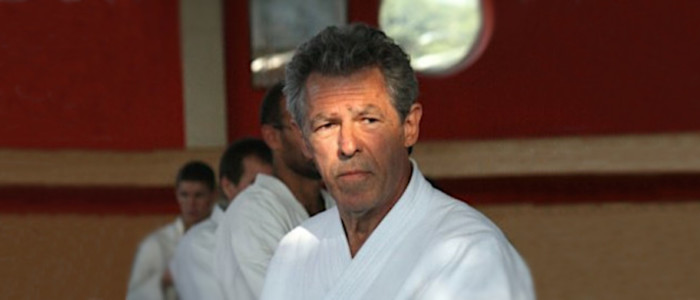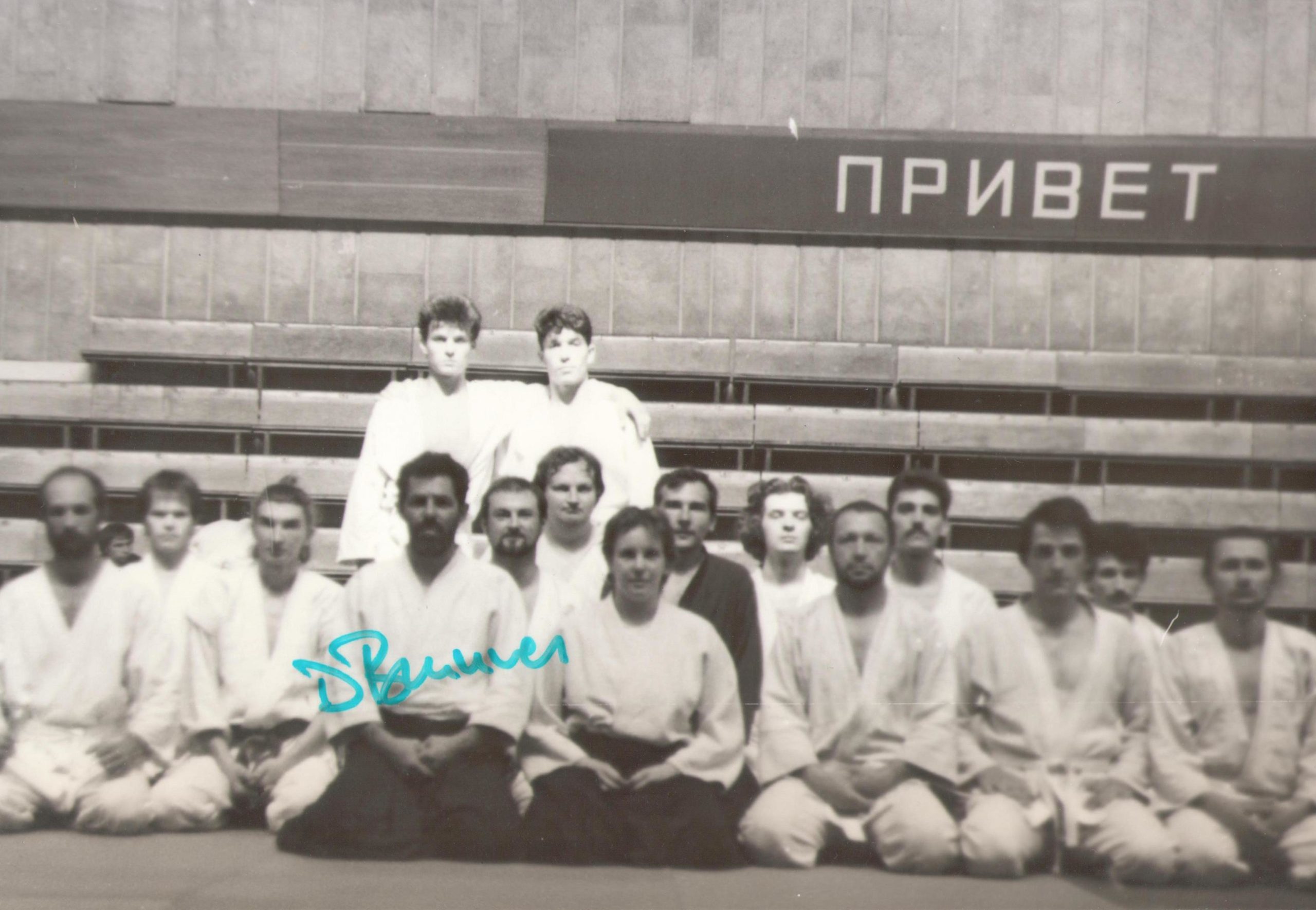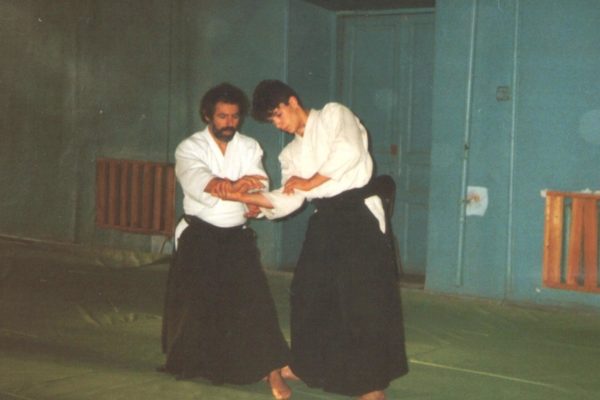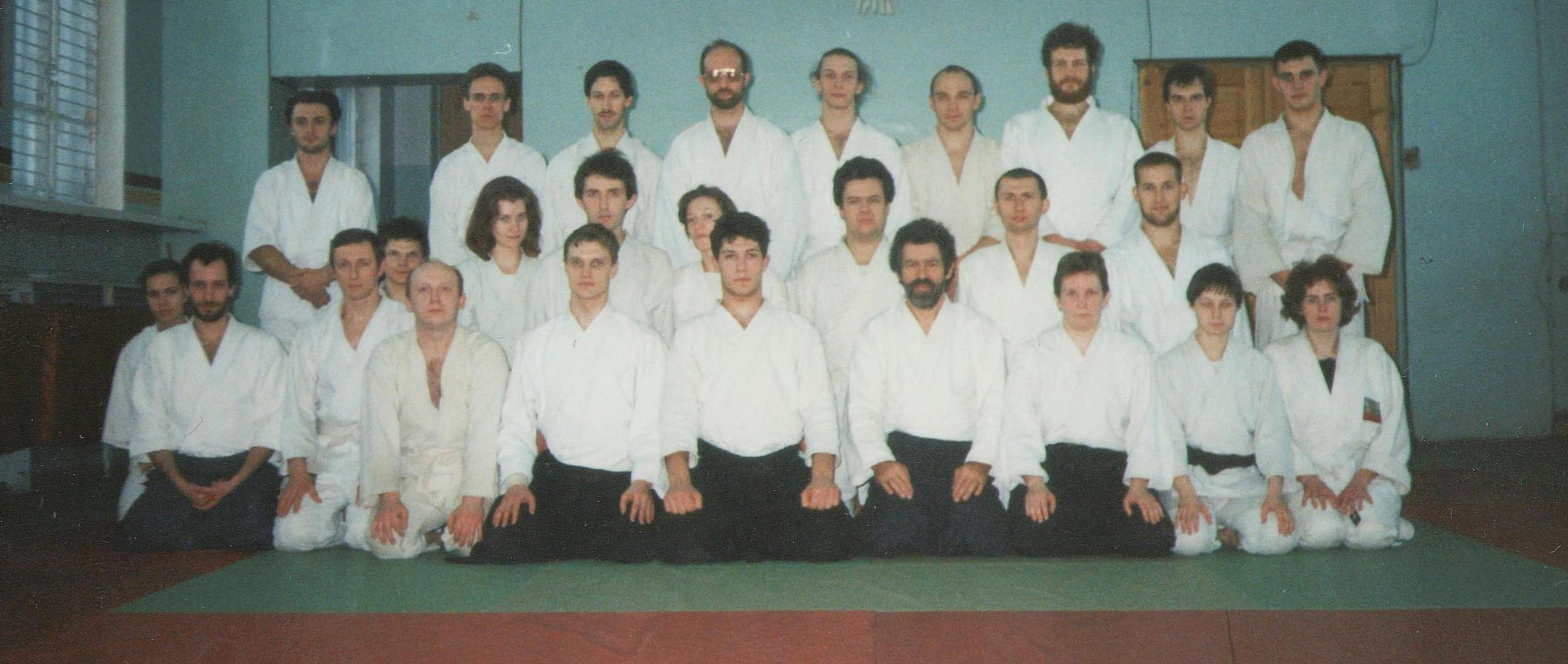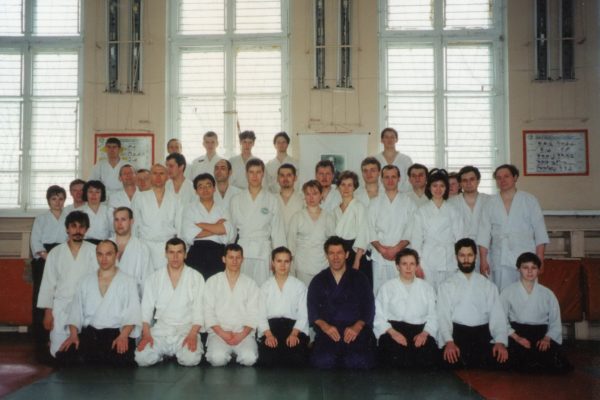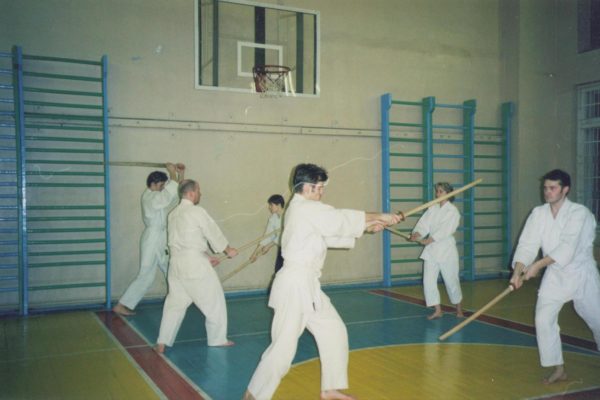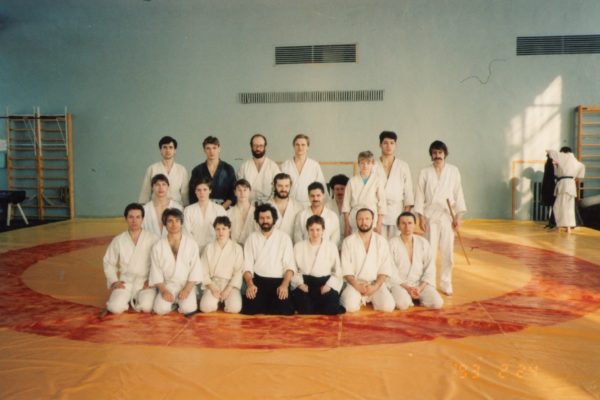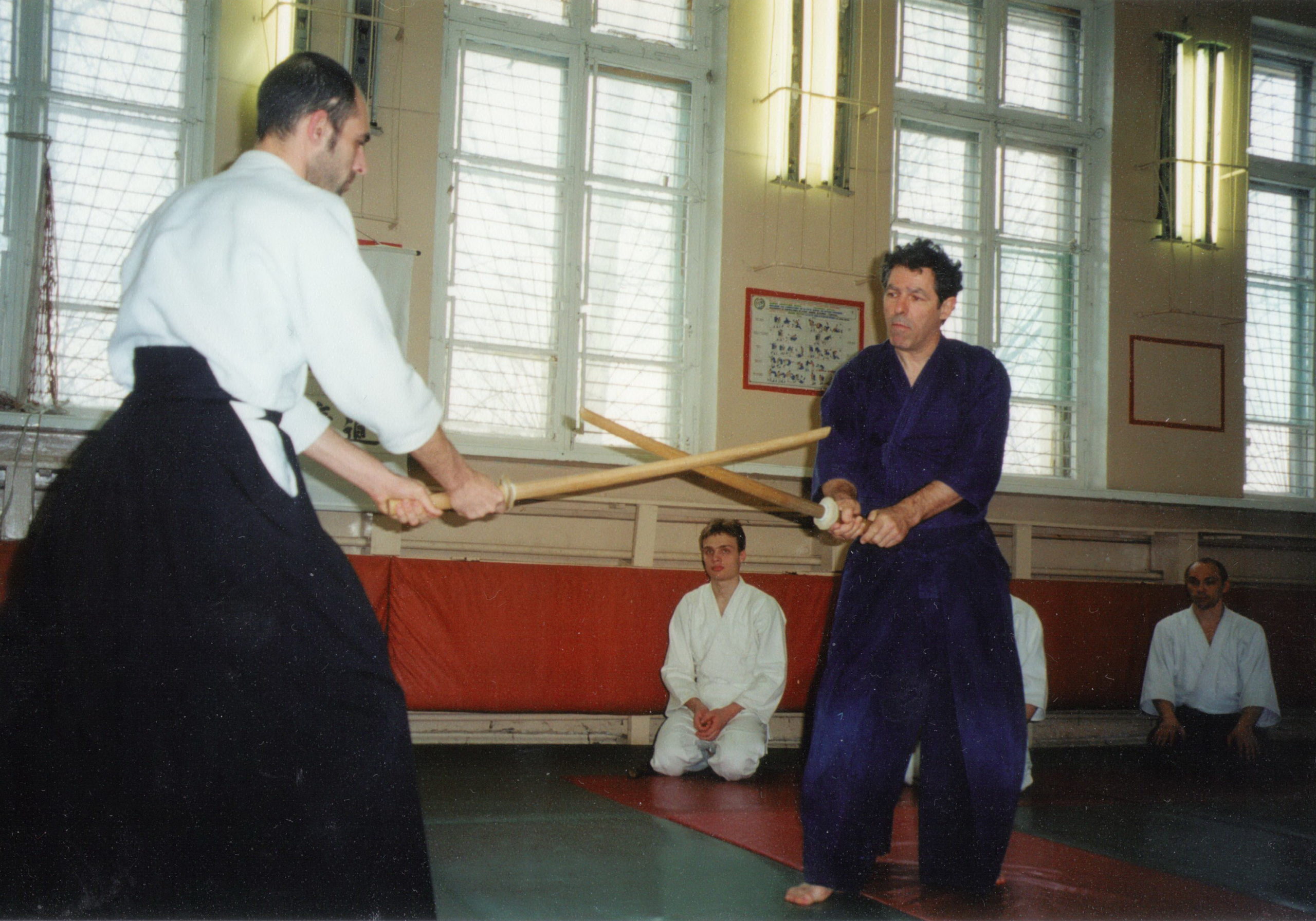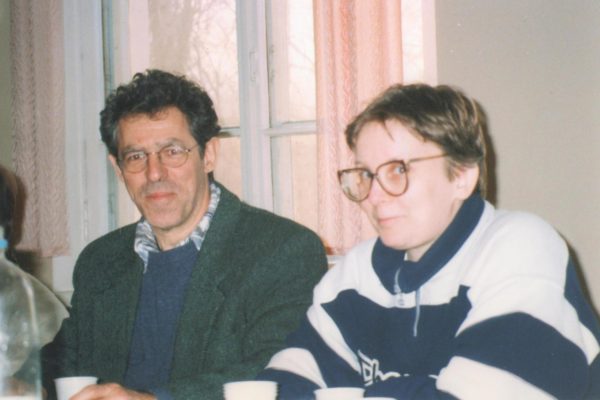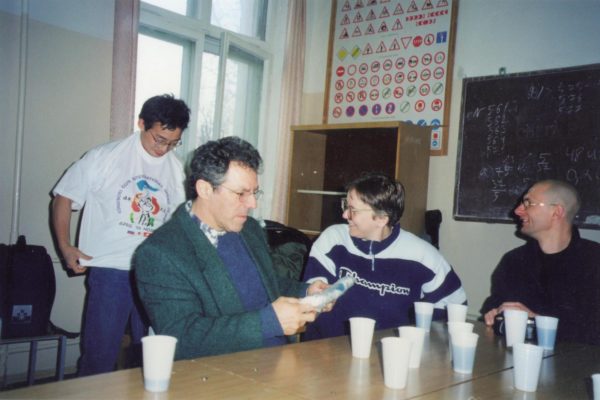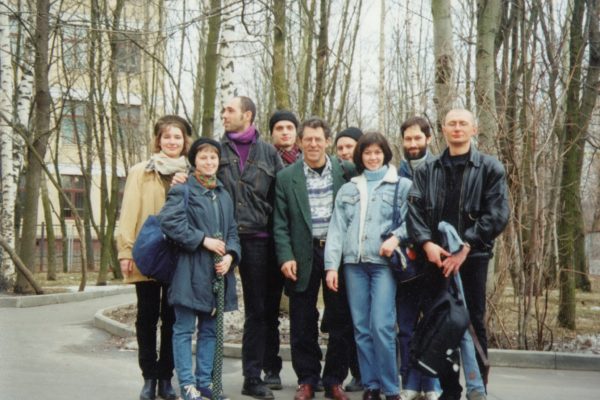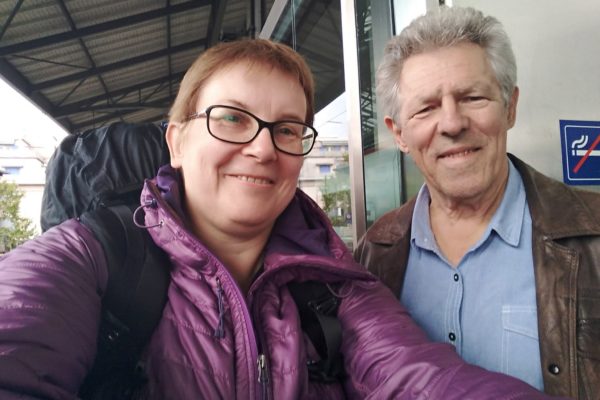Happy Birthday, Daniel Sensei!
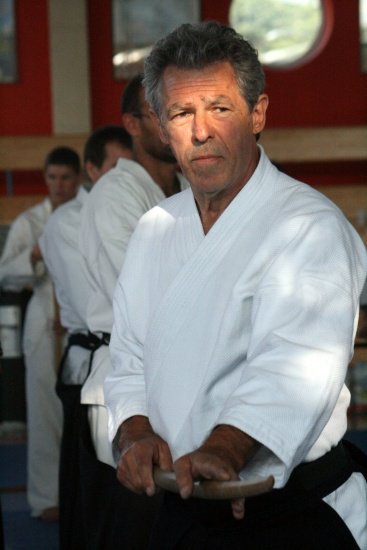
December 21 is the birthday of our friend and teacher, Shihan Daniel Brunner, 7 Dan Aikido Aikikai.
With all our heart we congratulate Daniel Sensei and wish him health, happiness, strength, joy, and many sincere students!
On this occasion we are publishing the translation of reminiscenes by shihan Vadim Grachev, 6 Dan Aikikai, senior instructor of Koinobori Dojo, shared recently on our website (original text here).
Сегодня 21 декабря день рождения нашего друга и учителя сихана Даниэля Брюннера, 7 дан айкидо Айкикай.
От всей души поздравляем, желаем здоровья, счастья, сил, радости и много искренних учеников!
По этому случаю мы публикуем перевод воспоминаний старшего инструктора Койнобори Додзё сихана Вадима Ивановича Грачёва, 6 дан Айкикай (оригинал здесь)
It is with a special fondness that I recall my first meeting with the wonderful person and master Daniel Brunner (shihan, 7 Dan Aikido AIKIKAI, Birankai, Switzerland).
In 1991 our friends decided to hold in Moscow a seminar directed by Brunner sensei. Daniel came to Moscow with a number of his students. The format of his classes was very different from what we had seen before. We were especially impressed by his weapons technique (bokken and jo).
During that first seminar, Daniel shaped our perception of such notions as distance, correct stance, zanshin, and a lot of others. We could see how sincerely he shared his knowledge. That first seminar looked like this. The very first class – a weapons class held in a large gym at the CSKA sports complex – was filled to capacity. When the practice was over, lots of people came up to Daniel with a request to administer a test to them. Some even wanted to take a test for a Dan degree right away, even though they had passed no official tests before. It was very unpleasant to watch. So embarrassing to see people grovel simply to increase their formal rank in Aikido despite their virtually nonexistent technical level...
Daniel straightforwardly replied that he came to Moscow to direct a seminar for his friends, to share his experience, and that he had no authority to administer a test. At the next class, the gym was barely half full! There was a lot more room, and the people who remained were the ones who really wanted to learn.
That seminar has stuck in my memory for its depth and atmosphere. Coming home after each class, I took notes of everything Daniel said. I remember his phrase: “1+1=1 is the essence of the work of uke and nage.”
When Daniel saw a student working with his instructor trying to “spare” the instructor and move in a way convenient for him, he immediately came up, paired with the “favored” instructor and started to smack him with his bokken so hard that it was disturbing to see. Saying: “Right now this is not your sensei, but a student just like you. Don’t be afraid of him! Practice sincerely!” As a result, the instructor himself looked imploringly at the student urging the latter to attack him earnestly rather than having to work with Daniel again.
There are many things you start to understand and appreciate only in the long run. Some of them you just have to grow into. At 17, it is very hard to understand right away what the master wants to teach you. Only through your own experience, over time, you can understand that all the things he said really have a very serious and deep meaning.
It was Daniel who advised Marina on the right way of seeking a teacher in Japan. That was especially surprising, because such an experienced person, after holding a seminar in Moscow, could easily have tried to tie the participants to himself, to make the dojo his branch. Such “missionary” activities were quite widespread at the time. Any visitor wearing a hakama could easily start a dojo in Russia. Being dazzled by the desire to be awarded a belt (best of all a black one straightaway) by any visitor from abroad (mostly from the US at the time) and thus demonstrate one’s chosenness and exceptionality was not uncommon. Even a real impostor saying he was an Aikido master could have thrived as a mentor. Daniel, on the other hand, never tried to fascinate, ensnare, or in any way tie us to himself in order to later capitalize on it, as so many people did. Instead he sincerely advised us on what we should do for our young dojo to develop dynamically. Based on his own experience and that of his Swiss dojo, he told us of the possible complications and ways to avoid them.
Daniel recommended us to seek a master not based on fashion or political interests, but considering the very essence of this wonderful Budo. He believed that our young dojo needed a master under 40 years old. He explained that a young instructor might yet reconsider his technique many times over, which would be hard for those following him. On the other hand, there was a risk in selecting a too senior master as a dojo curator, however skillful he might be. Because due to his age and extensive experience his technique would also change, becoming more and more sparing, succinct, and hard to understand, which wouldn’t quite suit young students and a young dojo.
Daniel himself was in a rather complicated situation at the time. When we first met he had a 4 Dan degree (which was then a very serious level for our country). He had had it for many years. Even though his deep understanding of Aikido technique, experience, and a long record of practice matched a higher level, he had long been in isolation due to various political intrigues. Daniel didn’t complain or seek sympathy. Quite the reverse, he spoke about it in a calm and dignified way, without bravado, as a man knowing what he wanted and consciously making his choice.
The story was that the sensei whom he sincerely considered his teacher lived in a different county, while another sensei was appointed to curate Aikido in Switzerland, of which Daniel was a citizen. Daniel continued practicing under the guidance of his sensei, but in order to live comfortably in his country and be able to take further tests he would have to abandon his teacher and switch to the new curator.
When Daniel asked his teacher to let him and his students keep studying with him, as part of his dojo, his teacher, a prominent and venerable sensei, refused. Yet Daniel didn’t abandon even such a teacher (unworthy of him, in my personal opinion), which had an impact on his further fate. For about 20 years he was unable take official Dan tests himself, yet, as a true master and true character, he provided such an opportunity for his students. So they were administered tests by the sensei overseeing Switzerland.
Daniel is a truly noble, honest, and courageous person. Only with age and time you start to perceive what this true Sensei, a Teacher not just by name or appointment, had to go through. He is a Sensei by calling, even though he doesn’t like being called so.
Yet every cloud has a sliver lining. Long-term joint practice brought Daniel close to one of the best Aikido masters, Kazuo Tchiba Sensei. Later Daniel sent his son to US for several years to study with Tchiba Sensei as an uchi deshi. I believe that his faithfulness and loyalty to his teacher, whom Daniel really respected and loved, have passed on to us, students of Koinobori Dojo.
I consider Daniel Brunner one of my teachers. Even though we haven’t seen each other for a long time, he is always in my heart.
Last year Marina and I planned to visit him in Lausanne. We bought tickets and reserved a hotel. Unfortunately, the trip didn’t work out because of the circumstances we all know.
By his example, Daniel pointed my young brains in the right direction. We all met a kindred person, a true enthusiast who, like us, wanted to practice Aikido rather than politics in Aikido.
I sincerely wish dear and respected Daniel Brunner and his wonderful family (wife and son) best health and happiness! I am forever grateful for the chance to get to know such a remarkable person and a true master – not only in Aikido, but in life as well!
Dear Daniel Sensei, my best wishes to you!

